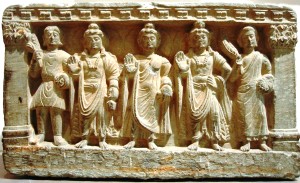ii.30-31 Observing the Law is the beginning of Wisdom
2.30 The Five Principles of Yama are:
Non-Violence
Truthfulness
Integrity
Chaste Spirit
Non-Attachment
Yama (Right Abstinence) consists of five principles that assure Right Development in the Unborn. The first is not willingly or intentionally inflicting harm on another, whether in thought, word, or deed. The second is the foundation upon which the others rest, and that is to uphold Truth in all circumstances. The Truth reflects the Light of the Unborn. This Illuminative Light reflects the ultimate Law that enlightens all one’s endeavors. If this Law of Light is honored first and foremost in one’s life, then the Illuminative Principle of the Unborn will guide and guard you throughout the course of that life. Living in the Pure-Light of the Unborn assures integrity of spirit. If one lacks this essential ingredient, then all one’s action is inauthentic and done in vain, thus following only the mass-will of the herd. Chastity of Spirit is also essential. This encompasses chastity of mind and body as well, for the mind is the emanation of the spirit and the body is the vehicle of the spirit’s will. Non-Attachment really sums up Yama, or the abstention from all that stifles growth in the Unborn. This includes one’s thoughts, one’s possessions, and especially the attachments that can lead to unhealthy relationships. Clinging to anyone who refutes and turns a blind-eye to the Buddhadharma, namely the Icchantikas, instead of keeping faithful company with those who uphold the Dharmatic Law, is the most serious offense to the Unborn; the whole corpus of Buddhism is filled with passages that insist such a foolish one will open up the gates of Avici-Hell.
2.31 The Principles are Universal.
Patañjali goes out on a limb here and insists that these principles are not limited by one’s status in life…regardless of caste, place of birth, or present life circumstances. For him these are the Great Universal Laws of life itself, and the ultimate vows that a Yogin/Yogini is called to uphold, honor and cherish. They are universal codes of conduct that if adhered to will lead to life and spiritual prosperity, instead of misfortune, suffrage, and death.


Patañjali is almost more excitement than I can take in one day, even in small portions. Hopefully once I calm down some of it will sink in through my thick skull!